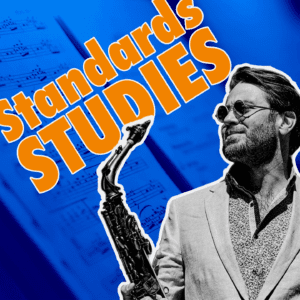Witchcraft is a popular jazz standard composed by Cy Coleman, with lyrics by Carolyn Leigh. The song was written in 1957 and became widely recognized when Frank Sinatra recorded it the following year. It’s characterized by a sophisticated harmonic structure that follows the unusual 40-bar ABCDA form.
In this course we will compare different versions of the ‘Witchcraft’, study the melodic and harmonic analysis, the arpeggios, chords scales, bop scales and I will share some improvisation techniques exercises.
Listen to the “Witchcraft” playlist and let me know in the comments which is your favorite version!
Course
Lyrics:
That sly come hither stare
That strips my conscience bare
It’s witchcraft
The heat is too intense for it
What good would common sense for it do
And although, I know, it’s strictly taboo
My heart says yes indeed in me
Proceed with what you’re leading me to
But one I wouldn’t switch
‘Cause there’s no nicer witch than you
Oops! This content is for members only — unlock it by upgrading your membership and take your jazz journey to the next level!
Oops! This content is for members only — unlock it by upgrading your membership and take your jazz journey to the next level!
Oops! This content is for members only — unlock it by upgrading your membership and take your jazz journey to the next level!


8 Responses
My podium : Franck Sinatra for the deepness of his voice, Donald Byrd because we don’t ear enough Baritone sax choruses ! , Georges Benson just because i love all of him it’s a good reason no? 😉 Special mention for the very bluesy the three sounds version.
Question or remark measure 94 (@57:45 ) you play G A(nat) B and so on, but in the melody it is G Ab so the scale could be with Ab?
https://vimeo.com/1027657374?share=copy
I like all versions because they are all different. Cy Coleman because he is the composer and it’s swing, sinatra for the phrasing and swing, Bill Evans for the trio interaction, Donald Bird for solos, Gene Harris for blues, Joey Defrancesco for soul
Absolutely, each artist brings something so distinctive to this tune! Cy Coleman really captures that classic swing feel as the composer, and Sinatra’s phrasing is just timeless. Bill Evans’ trio interaction is mesmerizing—always so conversational. Donald Byrd’s solos, Gene Harris’s bluesy vibe, and Joey DeFrancesco’s soulful touch all add layers of richness to the song. It’s amazing how one tune can be reimagined in so many ways.
My favorite version is that of Donald Byrd, one of my favourites in the sixties, and the only I know. Special mention to Pepper Adams chorus, one of my favourite barytone sax player. Then I like the version of Duke Pearson and Oscar Peterson’s version.
I think this very nice tune is underestimated. Thank you Alex for this welcomed reminder.
Great picks! Donald Byrd’s version is definitely a standout, and Pepper Adams’ baritone work is always something special—he brings such depth and energy. Duke Pearson and Oscar Peterson both bring their unique touches too, with Pearson’s arrangements and Peterson’s piano finesse making this tune shine in different ways. I agree; it’s such an underrated piece, and it deserves more attention. Thanks for sharing your thoughts!
I remember seeing Pepper Adams at the CIM (jazz school) in Paris. I was a teenager but I already knew his records with Mingus and the big band of Monk (his intervention on Monk’s Mood). He had played a concert with the trio of Geoges Arvanitas, when Georges was taking a solo he gave him a pat on the shoulder, when the drummer took a solo he laughed. Kenny Clatke was sitting next to me. I felt like I was hearing jazz live in front of me like I had never heard it before. I always preferred Pepper Adams to Gerry Mulligan. Shortly after Pepper and Kenny were dead. I still have the taste of that concert in my ears.